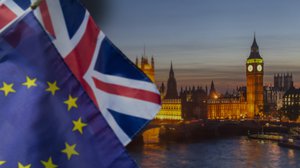[LUKE MCDONAGH]
A crucial part of the “Leave” campaign was this idea that by exiting the EU, the UK, its people, its Parliament, its government, could take back control of the laws that apply in the UK. So, what I’m interested in is how does this rhetoric apply in the context of patent law and copyright law in the UK.
Intellectual property rights like patents and copyright were not originally part of the foundational treaties of the European Economic Community, now known as the European Union. In fact, it was not until the 1960s and 70s when it became clear that there would need to be some input from the European Court of Justice, which is the main court of the EU. There have been some cases decided at the Court of Justice that have been of vital importance with regard to the EU’s patent laws.
One of the things the EU was concerned about when it passed the Biotechnology Directive was that we don’t know what human life is, there’s no consensus on when human life starts, there’s no definition in the directive on what a human embryo is. The European Court of Justice took a cautious view of stem cell patents and essentially said that any stem cell that involves the destruction of a human embryo cannot be patented because of moral grounds. So, this actually has had a major effect on the way in which research into stem cells is done in Europe because even though you can still do the research — the research is not illegal — you can no longer get a patent on the research you do. The UK could, if it broke away from the EU, choose to legislate different requirements for biotechnology. So that’s one area where the UK potentially could attempt to take back control and could attempt to come up with a different patent regulation to try to encourage more research in this area.
Patents protect inventions whereas copyright law protects creative works — works of literature, drama, poetry, film. All of these are protected under copyright law and have been protected in the UK for centuries. The UK has a fantastic history of the creative arts, from popular music to great playwrights to great painters to great filmmakers, so the UK is a major player, if not the major copyright exporter within the EU. For that reason, the UK’s exit from the EU is a significant event. The European Court of Justice has made a number of decisions that are of great significance to UK copyright law. The most important decision is the Infopaq case in 2009, where the court of justice essentially held that for all EU member states there was a uniform test of originality. That test is based on intellectual creation. Before that, the UK test had been skill, labour and judgement.
The same is true of the test for parody under the fair dealing defence. The European Court of Justice said that there had to be uniform understanding of parody. So, if the UK were to leave the EU and break away from the jurisprudence of the European Court of Justice, the UK could decide to apply a different test for originally — perhaps a lower one, perhaps a higher one — and it could make its own decision as to what constitutes a parody.
When we come back to the idea of “take back control,” we need to consider: what are the UK’s other obligations under international law? Under the WTO, and in particular the TRIPS agreement from 1994, the UK is bound to apply certain minimum standards on intellectual property rights including patents and copyright. For that reason, there’s a limit to how much the UK can take back control simply by leaving the EU. There’s also, of course, the UK’s obligations under the European Convention on Human Rights, which is a treaty of the Council of Europe, in which the UK has obligations to protect property rights and — as the clue is in the name — intellectual property rights are “property.” The UK could not, for example, withdraw all of the patents currently in existence in the UK because to do so would be the violation of the basic principles of property rights, compensation, fair process and so on, as protected by the European Convention on Human Rights. So, the most likely option for the UK is to come to some kind of agreement with the EU that would keep a similar level of protection — if not identical levels of protection as there is now — for both patents and copyright.
Ultimately, my view is that the UK will end up taking back control of patent law and copyright law much less than the rhetoric would have you believe. The UK’s largest trading partner after it leaves the EU will be the EU. And for that reason, keeping its laws and its regulatory programs aligned with the EU, in the area of intellectual property rights, simply makes sense. It’s what businesses want, it’s what a lot of politicians want and it’s the most likely scenario to occur.
[NARRATOR]
Intellectual Property Law is just one of many topics covered within Complexity’s Embrace.
This book looks at the legal governance challenges presented by the United Kingdom’s decision to leave the European Union and illustrates the many connective elements across all five topic areas.


